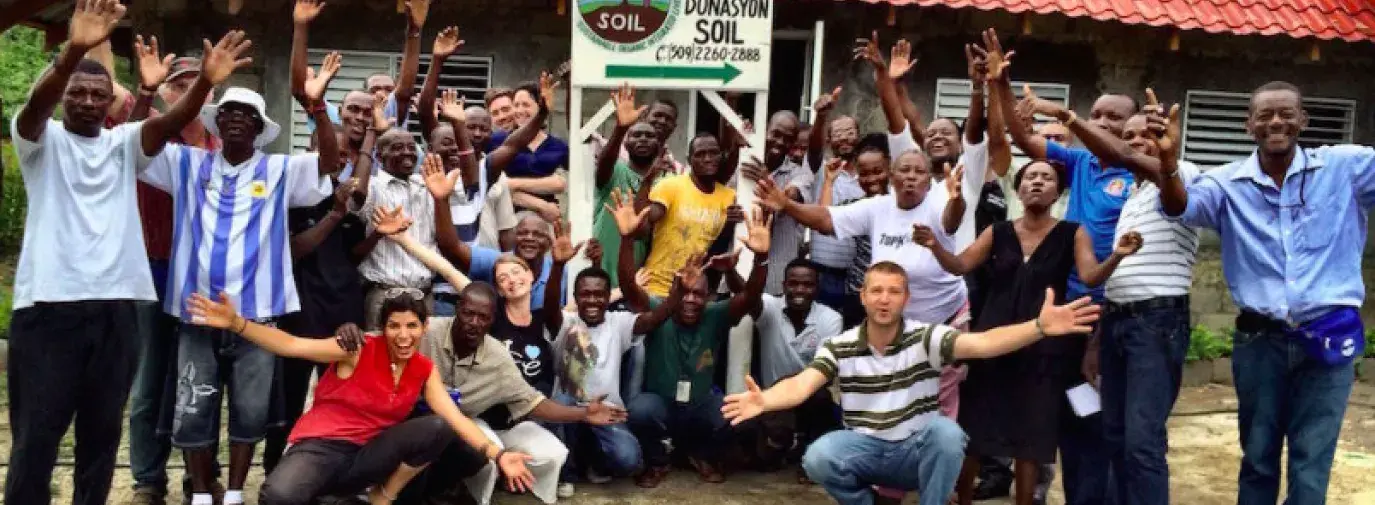
Tackling Sanitation and Soil in Haiti
One book was all it took to lead Dr. Sasha Kramer on the path to a tremendous impact by providing environmental sustainability and sanitation solutions in Haiti and globally. In a graduate class at Stanford University, Dr. Kramer read Eyes of the Heart: A Path for the Poor in the Age of Globalization written by President Aristide of Haiti, and the book’s call to action to empower women, children and the poor to address inequality was a powerful driver.
Dr. Kramer is an ecologist, human rights advocate, Executive Director and co-founder of SOIL. SOIL’s mission statement is to promote dignity, health, and sustainable livelihoods through the transformation of wastes into resources. SOIL transforms human waste into a regenerative agriculture solution. Dr. Kramer has won several awards and recognition for her humanitarian work, including being named a National Geographic Emerging Explorer, an Architect of the Future with the Waldzell Institute, a 2014 Schwab Foundation Social Entrepreneur of the Year, an Ashoka Fellow, and a 2017 Sarphati Sanitation Prize Lifetime Achievement winner.
Dr. Kramer recalls, “In 2004, President Aristide was overthrown in a US-backed coup. When I read about the coup in the in the US media, I realized what I was reading was so dramatically different from the vision that I had at that of the Haitian grassroots democracy movement. I wanted to understand it better, so I found a group in the San Francisco Bay Area called the Haiti Action Committee. They were sending people to Haiti to observe the demonstrations that were happening in the aftermath of the coup.”
The moment she stepped foot in northern Haiti and met the people she immediately fell in love. She frequently revisited Haiti while finishing up graduate school. In the course of those two years, Dr. Kramer says that sanitation, access to toilets, malnutrition, cost of food, and the challenges of farming were the repeated challenges she recognized from her interactions within the community. With her passion for ecology she wanted to figure out a way to incorporate all those challenges into a solution. As she states ecological sanitation just happened to be a very nice way to use ecological systems to address a wide range of basic human rights issues such as access to food, access to sanitation, and living in a clean environment.
When asked why do you tackle soil and sanitation at the same time? And why is it important to consider these two issues together? Dr. Kramer replied, “It occurred to me that if we are excreting all of the nutrients that we are consuming once we become adults, one of the keys to sustainable food provision in the future will be finding a way to harness all of those nutrients that we’re excreting. Let’s get them out of aquatic ecosystems where they’re making people and other creature sick, and back onto the land where they can restore soil fertility… [R]e-establishing this broken nutrient cycle through the recycling of the food we eat which is eventually the food we excrete. So, for me, sanitation and food are inextricably connected both in the sense that you wouldn't poop if you didn't eat, and eventually if we don't capture the nutrients in that poop, we’re not going to be able to eat anymore.”
To combat the severe sanitation crisis, in 2006, Dr. Kramer and SOIL developed the first composting toilet in Haiti. The compost-based toilet is locally-constructed and low-cost and does not require upfront infrastructure investments as is the case with sewers. Studies have shown that the use of latrines and sewer systems where the waste is left in one place (septic tanks, hole in ground, or ponds) produce high amounts of methane. Whereas, the use of composting container-based toilets would significantly reduce the amount of methane in the air as well as prevent waste from entering the soil and aquatic ecosystems, posing a threat to local communities and the environment.
The process of transporting waste from the households to the waste treatment facility and then transforming it into the soil is very simple. First, the containers are collected once every week and exchanged for new ones. Second, the containers are brought to the treatment facility where it is thermophilically composted, removing pathogens and creating a nutrient-rich compost. Lastly, the nutrients collected from the waste are restored into the soil providing valuable fertilization for agriculture and reforestation. Since building the first waste treatment facility in Haiti in 2009, SOIL has become one of the largest waste treatment operations in the country, treating over 40 metric tons of waste each month. Dr. Kramer states that SOIL’s impacts in Haiti include increased sanitation coverage, improved soil fertility and climate resilience.
According to the 2018 Global Climate Risk Index, Haiti was ranked number one among the top ten countries affected by climate change in 2016. Although, Haiti “produces 82 times fewer emissions per capita compared to the U.S…” it has the ability to provide a positive example in the effort towards mitigating climate change globally.
Visit SOIL in Haiti for more information.



